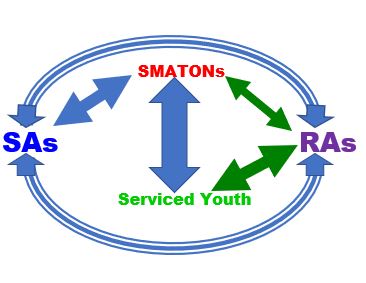Supportive Adults and SMOA

By reflection, SMOA understands that there are responsible adults in SMATONs’ lives. To distinguish them from the Responsible Adults in serviced Youths’ lives, SMOA defines Supportive Adults (SAs) as those parents, biologic or otherwise, grandparents, uncle, aunt or other individual of legal age and having responsibility for the SMATON.
SMOA engages these SAs at the outset, because without their assistance, SMOAs goal of sustained positive change in the socio-economic determinants of the undeserved will not be possible. SAs must engage with RAs, while the SMATON engage the serviced Youth.
The SAs receive presentations from the SMATONs about the basis for the service effort, the plans developed for the RAs, as well as the Serviced Youths, and assessment tools. Time and effort is expended to guide the SAs to engage the RAs, in manners which will facilitate the assimilation, as well as the learning objectives and reinforcement strategies that will foster dynamic, sustained learning and development within the serviced youth.
This element of identifying and engaging Supportive Adults (SAs), potentiating engagement with Responsible Adults (RAs), and thereby building a firm foundation to guarantee sustainability, is characteristic of SMOA DNA.
SMOA engages these SAs at the outset, because without their assistance, SMOAs goal of sustained positive change in the socio-economic determinants of the undeserved will not be possible. SAs must engage with RAs, while the SMATON engage the serviced Youth.
The SAs receive presentations from the SMATONs about the basis for the service effort, the plans developed for the RAs, as well as the Serviced Youths, and assessment tools. Time and effort is expended to guide the SAs to engage the RAs, in manners which will facilitate the assimilation, as well as the learning objectives and reinforcement strategies that will foster dynamic, sustained learning and development within the serviced youth.
This element of identifying and engaging Supportive Adults (SAs), potentiating engagement with Responsible Adults (RAs), and thereby building a firm foundation to guarantee sustainability, is characteristic of SMOA DNA.

